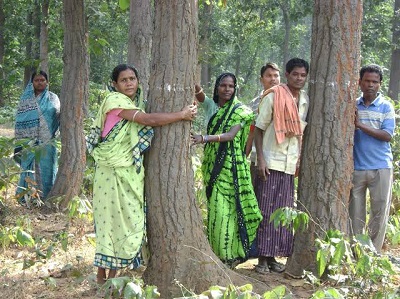Context
Forest conservation in India has historically been challenged by competing interests between conservation efforts and economic development, particularly concerning local communities' rights and livelihoods. The implementation of policies like the Panchayat (Extension to Scheduled Areas) Act (PESA) has aimed to address these challenges by empowering Scheduled Tribes (STs) as political actors in forest governance. This paper examines how PESA has influenced forest conservation outcomes by providing mandated political representation to marginalized communities living in or near forests. By analyzing empirical data and employing a difference-in-differences framework, the study assesses the impact of PESA on forest cover and deforestation rates across different regions and over time.
Empowerment through Political Representation
PESA, enacted in 1996, extended local governance structures to Scheduled Areas, ensuring ST representation in decision-making bodies like gram sabhas and local councils. Unlike previous decentralization efforts under the 73rd Amendment, PESA mandated specific quotas for ST individuals in leadership positions within local governments. This shift was pivotal as it empowered STs not only to participate in governance but also to influence policies that directly impact their traditional lands and resources.
The effectiveness of PESA lies in its ability to align conservation goals with economic interests of ST communities. Traditionally dependent on forests for livelihoods through activities like gathering non-timber forest produce, STs have a vested interest in sustainable forest management. The introduction of PESA facilitated a form of 'forest stewardship' among STs, wherein they actively engaged in protecting tree cover and resisting deforestation, primarily driven by commercial timber extraction and mining activities. This empowerment has not only enhanced local governance but also bolstered conservation efforts by integrating community-driven approaches into forest management strategies.
Impact on Forest Conservation
Quantitative analysis using remote-sensing data from satellites such as LANDSAT and Sentinel has shown significant correlations between the introduction of PESA and positive forest conservation outcomes. Villages under PESA governance exhibited higher rates of afforestation and lower rates of deforestation compared to those without mandated ST representation. This empirical evidence underscores the causal relationship between political empowerment of STs and improved forest health metrics over time.
Moreover, the study highlights the role of ST communities in opposing large-scale industrial activities detrimental to forest ecosystems. Areas under PESA jurisdiction experienced reduced deforestation rates near mining sites, indicating the effectiveness of empowered local governance in mitigating environmental degradation. By advocating for their rights to sustainable resource use, STs have effectively contributed to broader conservation goals while safeguarding their economic interests and cultural practices tied to forest ecosystems.
Comparative Analysis with Other Policies
Comparative analysis between PESA and the Scheduled Tribes and Other Traditional Forest Dwellers (Recognition of Forest Rights) Act, 2006 (FRA) reveals distinct impacts on forest conservation. While both legislations aimed to secure ST rights to forest resources, PESA's emphasis on political representation yielded more pronounced conservation benefits compared to FRA. The study attributes this disparity to PESA's focus on democratic decentralization, where local councils with ST representation gained autonomy and decision-making authority over forest management practices.
Administrative decentralization alone, as exemplified by FRA, lacked the institutional mechanisms necessary to empower local communities in a meaningful way. Without mandated political representation, FRA did not achieve significant improvements in forest conservation beyond what local communities could achieve through traditional resource management practices. This comparison underscores the importance of democratic empowerment in achieving sustainable development outcomes aligned with conservation objectives.
Challenges and Recommendations
Despite its successes, the implementation of PESA has faced challenges in various states, such as inadequate representation of STs in gram sabhas and local councils. In states like Gujarat, where PESA implementation has been deficient, there is evidence of continued marginalization of ST communities and insufficient protection of their forest rights. Addressing these challenges requires not only effective enforcement of existing laws but also broader policy reforms aimed at enhancing ST participation and representation in decision-making processes.
Moving forward, policymakers must prioritize inclusive governance models that empower marginalized communities while balancing economic development and conservation imperatives. This entails strengthening institutional capacities at the local level, ensuring equitable distribution of resources, and fostering partnerships between government agencies, civil society organizations, and indigenous communities. By promoting transparency and accountability in forest governance, India can build upon the successes of PESA and similar initiatives to achieve sustainable development goals in forested regions.
Conclusion
In conclusion, the Panchayat (Extension to Scheduled Areas) Act has emerged as a transformative policy tool for promoting forest conservation through empowered political representation of Scheduled Tribes in India. By granting ST communities a voice in local governance and decision-making, PESA has facilitated 'forest stewardship' practices that align conservation efforts with economic interests. Empirical evidence confirms that ST-mandated representation under PESA has led to increased tree canopy and reduced deforestation rates, particularly in regions vulnerable to commercial exploitation of forest resources.
The comparative analysis with other legislative frameworks underscores the unique contributions of democratic decentralization in achieving sustainable development outcomes. While challenges remain in ensuring uniform implementation across states, the principles of inclusive governance embedded in PESA offer valuable insights for future policy formulation and implementation. By leveraging local knowledge and community participation, India can effectively balance conservation priorities with socio-economic development goals, thereby safeguarding the rights and welfare of forest-dwelling ST communities for generations to come.
|
Probable Questions for UPSC Mains Exam
|
Source - The Hindu







